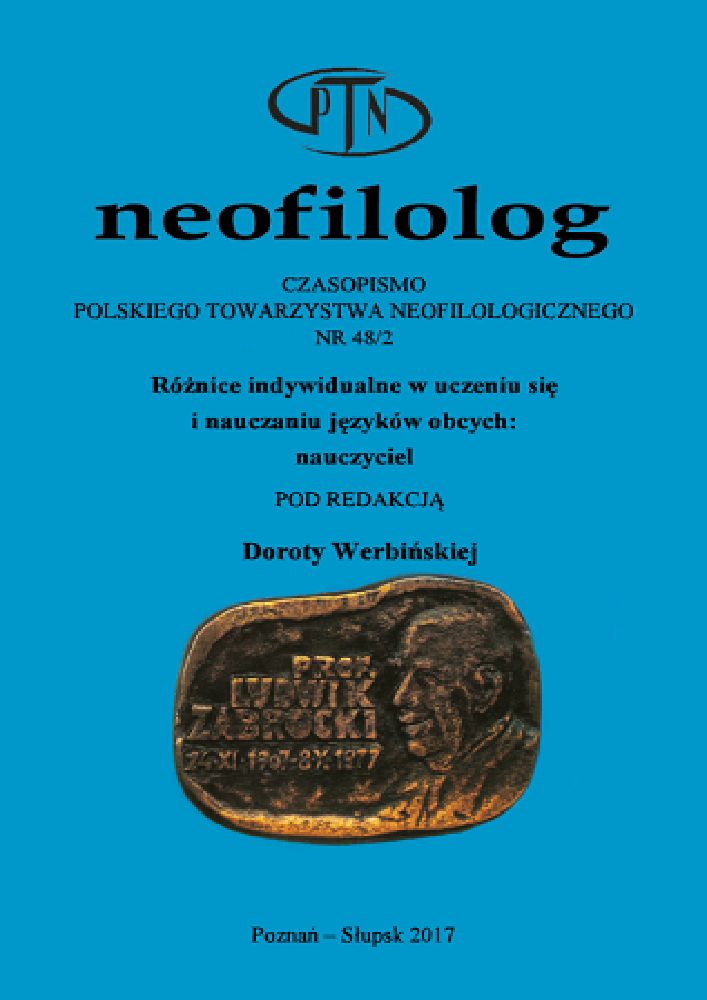Résumé
The tasks that the contemporary teachers of foreign languages face as well as the roles that they should assume as leaders of the educational process are of complex nature. This complexity is a result of numerous social changes and transformational processes. In response to these changes, educators’ roles keep being redefined so that the tasks that the teachers take up could be as effective as possible in the given time and space. These modified roles of teachers are the subject of this article. In the theoretical part, the results of the analysis of the literature on foreign language teaching are presented, with the focus on teacher roles and tasks. The analysis indicates the main development tendencies in foreign language teaching after the breakthrough caused by the communicative approach. The empirical part presents the outcome of research into how contemporary middle school students identify the roles and tasks of the teacher of German. The results of the study may contribute to the scholarly reflection on the role of the teacher in the foreign language teaching process.
Références
Brown, H. D. 2001. Teaching by principle – an interactive approach to language pedagogy. New York: Pearson Education.
Brzezińska, A. I. i Czub, T. 2013. „Zaufanie społeczne jako wyzwanie i ratunek dla polskiego systemu edukacji”. Nauka, 1: 31-44.
Dakowska, M. 2005. Teaching English as a foreign language. Warszawa: Wydawnictwo Naukowe PWN.
Dickinson, L. 1987. Self-Instruction in Language Learning. Cambridge: Cambridge University Press.
Jastrzębska, E. 2011. Strategie psychodydaktyki twórczości w kształceniu językowym (na przykładzie języka francuskiego). Kraków: Impuls.
Komorowska, H. 1988. Ćwiczenia komunikacyjne w nauce języka obcego. Warszawa: Wydawnictwa Szkolne i Pedagogiczne.
Komorowska, H. 2009. Metodyka nauczania języków obcych. Warszawa: Fraszka Edukacyjna.
Miastkowska, B. 2010. „Użycie języka ojczystego na lekcji języka obcego: sukces czy porażka?” Języki Obce w Szkole, 1: 46-50.
Michońska-Stadnik, A. 1996. Strategie uczenia się i autonomia ucznia w warunkach szkolnych. Wrocław: Wydawnictwo Uniwersytetu Wrocławskiego.
Nęcka, E. 2005. Trening twórczości. Gdańsk: GWP.
Ortega, L. 2007. „Meaningful L2 practice in foreign language classrooms: A cognitiveinteractionist SLA perspective”. (w) Practice in a Second Language. Perspectives from Applied Linguistics and Cognitive Psychology. (red. R. DeKeyser). Cambridge: Cambridge University Press, str. 180-207.
Pfeiffer, W. 2001. Nauka języków obcych. Od praktyki do praktyki. Poznań: Wagros.
Siek-Piskozub, T. 2001. Uczyć się bawiąc. Strategia ludyczna na lekcji języka obcego. Warszawa: Wydawnictwo Naukowe PWN.
Szpotowicz, M. (red.). 2011. Europejskie Badanie Kompetencji Językowych ESLC. Raport Krajowy 2011. http://eduentuzjasci.pl/badania/110-badanie/179-europejskie-badanie-kompetencji-jezykowych.html, DW 20.08.2017.
Watson, M. J. i Emerson, S. 1988. „Facilitate learning with humor ”. Journal of Nursing Education, 2: 89-90.
Wilczyńska, W. 1999. Uczyć się czy być nauczanym? O autonomii w przyswajaniu języka obcego. Warszawa: Wydawnictwo Naukowe PWN.
Zawadzka, E. 2004. Nauczyciele języków obcych w dobie przemian. Kraków: Impuls.
Licence
© Magdalena Białek 2017

Ce travail est disponible sous licence Creative Commons Attribution - Pas de Modification 4.0 International.
Auteurs :
Les auteurs de textes acceptés pour publication dans la revue Neofilolog sont tenus de remplir, signer et renvoyer à l'adresse de la rédaction, un accord sur l'octroi d'une licence gratuite pour les œuvres, avec obligation d'accorder une sous-licence CC.
En vertu de cet accord, les auteurs des textes publiés dans la revue Neofilolog accordent à l'Université Adam Mickiewicz de Poznań une licence non exclusive et gratuite et permettent l'utilisation de la sous-licence Creative Commons Attribution-NoDerivatives 4.0 International (CC BY-ND 4.0).
Les auteurs se réservent le droit de disposer librement de l'œuvre.
Utilisateurs :
Les utilisateurs d'Internet intéressés ont le droit d'utiliser les œuvres publiées à partir de l'année 2017 sous réserve des conditions suivantes :
- reconnaissance de la qualité d'auteur - l'obligation de fournir des informations sur la qualité d'auteur, le titre, la source (liens vers l'œuvre originale, DOI) et la licence, ainsi que l'œuvre distribuée ;
- sans créer d'œuvres dérivées - l'œuvre doit être conservée dans sa forme originale, p. ex. les traductions ou les interprétations ne peuvent être distribuées sans le consentement de l'auteur.
Tous les textes publiés sont soumis au droit d'auteur.
Autres :
L'Université Adam Mickiewicz de Poznań se réserve le droit à la revue dans son ensemble (mise en page, forme graphique, titre, conception de la couverture, logo, etc.).
.
